Connectedness, Balance, Oneness, Union, Completeness, Fullness, Nonduality

God is Holy and WHOLLY
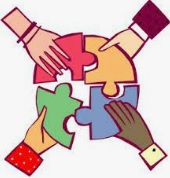
The "integration of the negative" rather than insisting that God values perfection or an idealized morality, Francis of Assisi intuited, through the example of Jesus’ life and death, that God could be found in all things, even those our religion and culture urge us to reject. Therapists call this pattern of admitting our shortcomings and failures “embracing our shadow.” Such surrendering of superiority, or even a need for superiority, is central to any authentic enlightenment. The Beatitudes are all about incorporating what seems like disorder (a negative), which promotes a much better and different level of consciousness. (Rohr)
Spiritual leaders who lack basic human compassion have almost no power to change other people, because people intuitively know they do not represent the Whole and Holy One. (Rohr)
So, how do we believe in a loving God while living in a sorrowful world? In the end, evil is not a problem to be answered; love is a reason to live. Where is God? Manifested in hospital rooms, soup kitchens, teachers, support for Ukraine, etc. God is present in those who make sacrifices for love and justice. LOVE MORE, AND YOU WILL FIND GOD. (ePost 6/25/23)
Holy describes something that is sacred, something that is associated with a deity, something saintly, something deserving reverence and worship. The word holy is derived from the Old English word halig, which means sacred or Godly. Holy is an adjective. Wholly means entirely, in full, completely and in every way.
As “holey” people, we have cracks, rips, tears, dents and chips. Some days we simply cannot imagine being the container that holds anything sacred, much less God, when we see our lives as broken, smoldering, faulty heaps of barely working humanity. But let me suggest that we can move from holey-ness to wholeness and holiness when we pay attention to the graced moments that usually happen without warning. (catholicmessenger.net)
We are separated (in our consciousness) from God (who is pure and perfect) by sin (missing the mark), by our limitations/imperfections, and by our dependence upon self/knowledge rather than God's grace. (Randy)
A collective spiritual wisdom is necessary for the healing of ourselves and our planet. Our collective awakening lies in our ever-deepening, continuously expanding humanity. The trick is to be as fully present as possible to the holiness of each moment. Starr cautions that although our individual gifts are important, so too are the gifts of our religious traditions (that have collected a series of vital tools to help us build a life that includes heightened consciousness of the sacred). By saying yes to the best of our own heritage and entering the holiest grounds of one another’s faith traditions, we may be able to usher in an age of love within our own lifetime. We can only do this together and dive into the well of each faith and emerge with the treasure that connects us all. (Rohr/Starr)
The visible world is an active doorway to the invisible world, and the invisible world is much larger than the visible. Matter is, and has always been, the hiding place for Spirit, forever offering itself to be discovered anew. (Rohr)
See Gospel of Thomas saying 30
The Oneness of Paradox

The one and many mystery is revealed in the Trinity: the three are maintained as diverse, different and distinct, and yet they are radically “One”! In the Trinity, we have the paradox at least metaphorically resolved. This Divine pattern is most beautifully revealed in “all the array [fullness] of creation” (Genesis 2:1). (Rohr) - see Reality - Creation and see Reality - Unity of Diversity
If you want to change the world, change yourself. I you want to gain the world, let it go, and surrender to God. If you want to find God in the world in the world, seek him first in yourself. Enter the inner kingdom, then the outer kingdom will also be opened to you. We can only gain what we have truly let go; there lies the paradox.11,p117
The only thing needed is a willingness to surrender to the naked now, which God always inhabits, where the Incarnation always takes place and is always mysterious, where God, in every moment, is perfectly hidden and, at the same time, perfectly revealed. Hold that paradox.(Rohr)
Mystics see through a lens of paradox: which points beyond itself to a truth that both transcends and includes logic, a truth that is alive, generative, and whole. Such a dynamic mode of knowing demands our complete attention. Even though the night feels impenetrable now, dawn is coming, when we will see with our own eyes that not only is every little thing going to be alright, but that it has been all along. (Rohr)
We can not enter the ground of our being unless we try not entering it abd open to the present moment. (p50, The Way of Paradox)
Going out and yet remaining within is the key to all spiritual life. (p54, The Way of Paradox)
It’s a paradoxical experience. If we don’t have both, we don’t have the true or full experience of the Holy. Mysticism begins when the totally transcendent image of God starts to recede, and there’s a deepening sense of God as imminent, present, here, now, safe, and even within me. (Rohr)
The Reality of God is something that can be grasped only within the tension and clash of opposites. These contraries are all contained in an all-embracing unity. GOD IS THE COMING TOGETHER OF OPPOSITIES. The highest truth can be grasped only through paradox. The cross and resurrection is perception of unity in the clash of opposites is realized to the highest degree in which many mysteries will be unlocked. (p24-27, The Way of Paradox)
See Knowing God Mystically/Intuitively and Wisdom's Paradox/Mystery of God's Way
Compassion (To Suffer With)

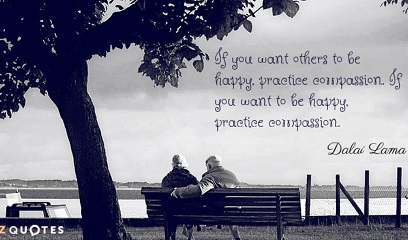
The suffering born of love: Every form of love invites suffering. (ePost,9/22/20)
It was because he was not understanding. And he learned, compassion. And with his eye of compassion He saw his enemies Like unto himself, And he learned love. Then, he was answered. (The Balance by The Moody Blues)
A human being is part of the whole called by us universe, a part limited in time and space. We experience ourselves, our thoughts and feelings as something separate from the rest. A kind of optical delusion of consciousness. This delusion is a kind of prison for us, restricting us to our personal desires and to affection for a few persons nearest to us. Our task must be to free ourselves from the prison by widening our circle of compassion to embrace all living creatures and the whole of nature in its beauty. The true value of a human being is determined primarily by the measure and the sense in which they have obtained liberation from the self. We shall require a substantially new manner of thinking if humanity is to survive. (Albert Einstein)
The road to spiritual maturity winds through compassion - a path of the feminine, the intuitive, and the heart. Heart implies a unitive aspect of one's humanity that is greater than mere emotion - encompassing body, feelings, will, intuition, and thought.9,p264
How we often attempt to keep grief separate from our lives, and how welcoming our grief can open us to compassion. (Francis Weller)
If you do not live with compassion, then you have not entered into the heart of God,(Rohr)
Connectedness
Spiritual connectedness is an important and unique approach to live our lives by effortlessly living a happy and healthy lifestyle. It can help you rise above everyday difficulties, transcend your ego, and groom your natural talents, character, and sense of self. If you know and are aware that our lives are a part of something bigger than us, the concept of spiritual connectedness can awaken something that lies deep inside you and give meaning to our lives. It tells us that all life on earth is interconnected just like our body and spirit. That every element in our physical world is based and established by a spiritual infrastructure. Spirituality is a feeling of connectedness to something. Of feeling something that you can not experience through your physical senses, rather than through your soul and inner intuition. This can be anything from our daily lives as long as we develop a spiritual connection and use that to become better human beings. (vbchange.com/spiritual-connectedness/)
There are four kinds of connectedness:

to the inner self or soul
see Know Thyself

to society and others
see Collective Consciousness

to nature and environment
see Knowing God thru Nature

to a creator spirit or sacred source
see God as Mystery
Balance or Middle Way
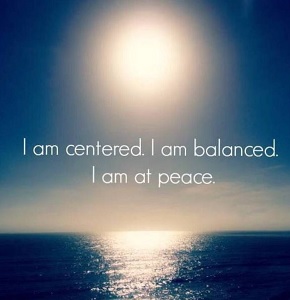
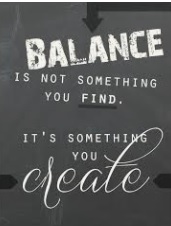
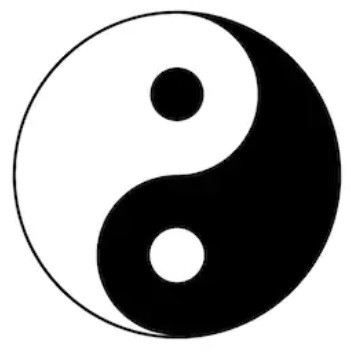

Yin yang is a concept of dualism, describing how obviously opposite or contrary forces may actually be complementary, interconnected, and interdependent in the natural world, and how they may give rise to each other as they interrelate to one another. Yin and yang can be thought of as complementary (rather than opposing) forces that interact to form a dynamic system in which the whole is greater than the assembled parts. According to this philosophy, everything has both yin and yang aspects (for instance, shadow cannot exist without light). (Wikipedia)
We are often at war with ourselves, but we have to find that balance between our heart and our mind (?)
Spiritual life is not just a matter of our seeking God; it is also a matter of God seeking us - by being still still and waiting. Balance striving with detachment, love with restraint.11,p99
To presume we know is always dangerous. There is an arrogance that comes from knowing and thinking that we normally have the right answer. That’s why great spiritual traditions balance the kataphatic way (knowing God through words and ideas) with the apophatic way - humble knowing (knowing God through silence and unknowing). Franciscan theologian Bonaventure (c. 1217–1274) ended his classic text The Soul’s Journey into God with this instruction, which represents the apophatic tradition of unknowing: If you wish to know how these things come about, ask for grace, not instruction, desire not understanding, the groaning of prayer not diligent reading, the Spouse not the teacher, God not man, darkness not clarity, not light but the fire that totally inflames and carries us into God. (Rohr)
And eight hundred years later from St Francis, we’re still trying to learn how to balance contemplation and action.(Rohr)
Happiness is not a matter of intensity but of balance and order and rhythm and harmony. (Thomas Merton)
There is a middle way between the extremes of indulgence and self-denial, free from sorrow and suffering. This is the way to peace and liberation in this very life. The middle way describes the middle ground between attachment and aversion, between being and non-being, between form and emptiness, between free will and determinism. The more we delve into the middle way the more deeply we come to rest between the play of opposites. When we discover the middle path, we neither remove ourselves from the world nor get lost in it. We learn to embrace tension, paradox, change. Instead of seeking resolution, waiting for the chord at the end of a song, we let ourselves open and relax in the middle. (jackkornfield.com/finding-the-middle-way)
see 61 quotes for balance
Dualism vs Nondualism
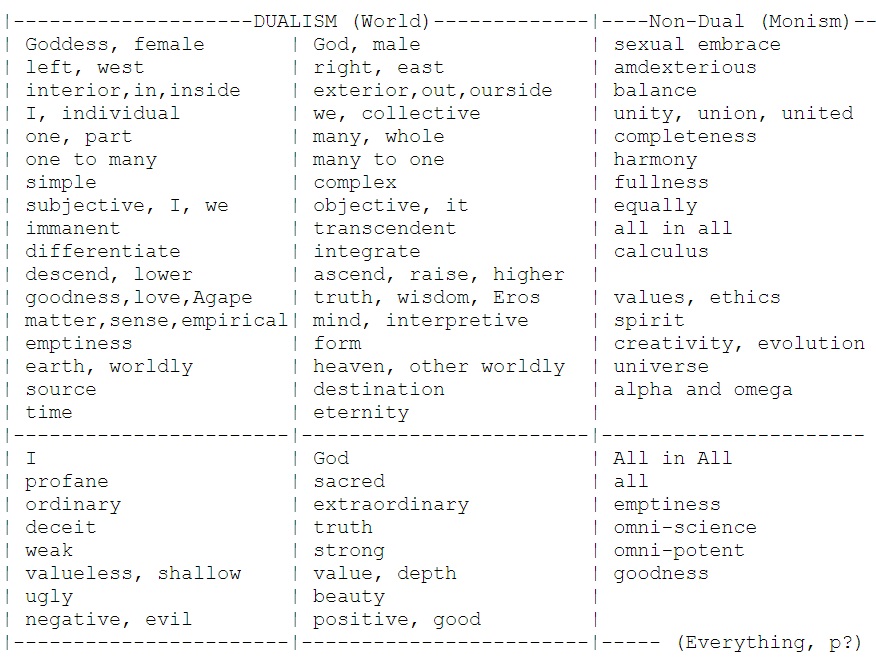
Nonduality and Equality
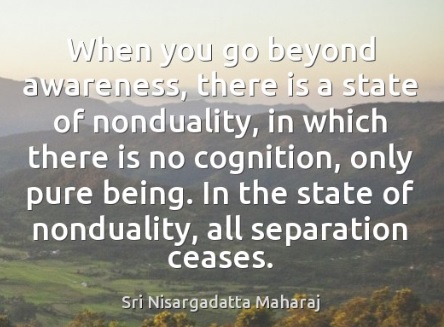
Yahweh - In Hebrew 'Yah' is feminine and 'weh' is masculine.5
Religions offer a unified vision of reality because God is one and the reality which He created must have unity and integrity. A unified and integrated vision of reality in which God as the Creator has an intimate relationship with His creation. Since God is the only source of reality, He alone must be worshipped. www.resetdoc.org/story/religion-unity-and-diversity/
Synthesis - like H2O or mankind as body and spirit
The cross is the "coincidence of opposites." If we agree to hold opposing energies creatively until they transform us, it becomes redemptive suffering.6,p18-19
To know thyself is to know God
See Gospel of Thomas logions 3,12,29,70,113
Non-duality, or oneness, is not so much a change in state of consciousness as a change in the seat of consciousness. And that it comes about as the natural fruit when the mind is in the heart. (Cynthia B)
Life is both/and - abundant sorrow and abundant joy. (Rohr)
Duality can't finally succeed because they do not have the ability to “incorporate the negative,” which will always be present. The greatest enemy of ordinary daily goodness and joy is not imperfection, but the demand for some supposed perfection or order. Only the unitive or nondual mind can accept this and not panic, but, in fact, grow because of it and grow beyond it. There is a way through all absurdity and tragedy. That way is precisely through accepting and even using absurdity and tragedy as part of God’s unfathomable agenda. The compassionate holding of essential meaninglessness or tragedy, as Jesus does on the cross, is the final and triumphant resolution of all the dualisms and dichotomies that we face in our own lives. (Rohr)
To be in a realized state is to reach the highest wisdom that sees the essential equality of all things.(p317, Zen and the Gospel of Thomas)
Eckhart prayed "Therefore I pray God, that He may rid me of God" to reach a point when there is no more 'God' and 'I' but only Oneness. We can unite and understand only in darkness and silence, in a kind of unknowing knowing. (p40-41, The Way of Paradox)
see knowing God intuitively
Forgiveness and Reconciliation and Mercy
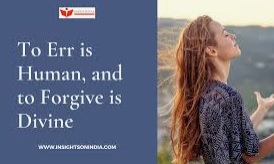 Also see Forgiveness and Grace in Ascension
Also see Forgiveness and Grace in Ascension
Forgiveness for imperfection. Forgiveness is missing the mark. Forgiveness reconnects us to spirit?
A single word that sums uping the entire Christ message is 'reconciliation'.2,p53
Reconcile means to bring together into oneness.2,p208
To err is human; to forgive, divine.
When we do not forgive, the enemy takes up residence within us in the form of resentments, grudges and bitterness, then estranges us from others. Forgiveness can clear the bitterness away. It can set the prisoner free. (3/36/20 CNY Inspirations by Father John Rose)
Humans often end up doing evil by thinking they can and must eliminate all evil, instead of holding it, suffering it themselves, and learning from it, as Jesus does on the cross. My acceptance of a cruciform world mirrors my ability to accept a cruciform me. God has created a world where there is no technique or magical method for purity or perfection. Forgiving love is the only way out. (Rohr,10/16/20)
Everyone, without exception, has a shadow. There is no shame or guilt associated with it. Fr. Richard writes, “The God Archetype is the part of you that drives you toward greater inclusivity by the ability to recognize and forgive your own shadow side.” (Rohr - Everything is Sacred, Part 3)

Healing is movement and work toward wholeness. Healing is knowing our woundedness; it is developing an intimacy with the ways in which we suffer. Healing is learning to love the wound because love draws us into relationship with it instead of avoiding feeling the discomfort. (Rohr,9/17/20)
Healing does not mean going back to the way things were before, but rather allowing what is now to move us closer to God. (Ram Dass)
It is humble awareness of our own humanity that allows us to forgive. It is this knowledge of my own frailty that helps me find my compassion, my empathy, my similarity, and my forgiveness for the frailty and cruelty of others.(Rohr)
The Crucified and Risen Christ uses the mistakes of the past to create a positive future, a future of redemption instead of retribution. He does not eliminate or punish mistakes. He uses them for transformative purposes. Forgiveness might just be the very best description of what God’s goodness engenders in humanity.(Rohr)
We are the ones who clutch our sins and beat ourselves instead of surrendering to the divine mercy. That refusal is a form of pride - meaning 'I only going to accept it when I'm worthy and can preserve my so-called self-esteem.' (p146,Jesus's Alternative Plan)
Mercy is what pleases me, not sacrifice (Matt 9:13)
Inclusion and Unity of Diversity

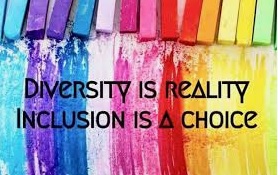
Let it hurt, then let it go. (Nikita Gill)
Humanity consistently has to face the problem of unity and diversity. We habitually choose our smaller groups, because we don’t know how to belong to a larger group. That demands too much letting go.(Rohr)
Only the Whole is Holy. Individually we are too small, too fragile, too broken to fully represent the Mystery of Christ. "The Body is not a single part, but many" (1 Cor. 12:14). We’re trained to compare and compete; that’s the nature of capitalism. Holding our oneness and individuality together reveals the Christian mystery: “You are all Christ’s Body, and individually, you are parts of it” (1 Cor 12:27).(Rohr)
Nondualism / Union / Completeness / Wholeness / Balance / Fullness:

The objective personal approach tended to take the Bible literally, whereas, Mystics tried to define what Jesus' experience symbolized subjectively and tened to look for answers from the God within themselves rather than from moral law. Each approach was working from a completely different level of consciousness with a different end in mind.2
Religion begins with the making of a distinction between the pure and the impure. Jesus consistently ignores such a distinct. Relative thinking allows us to dismiss or decrease the energy in everyting; relational thinking allows us to increase the energy and kneel in awe before God-in-all-things.6,p87
Initially, the sole purpose of practicing yoga was to experience spiritual enlightenment. In Sanskrit (the ancient language of India), yoga translates as "yoke" or "union," describing the integration of mind and body to create a greater connection with one's own pure, essential nature. (www.yogajournal.com/practice/not-all-yoga-is-created-equal)
It is necessary to accept, work with, and even love an apparent duality in order for us to achieve a transcendent non-duality.2,p6
We are already in heaven. When we die we no longer have the input from our physical senses that distract most of us from being fully aware of the spirit body that’s been with us all along. (www.physicsandgod.com/heaven-is-a-hologram)
We almost all think that good morality will lead to mystical union, but, in fact, mystical union produces correct morality.6,p38
Their personal will would become so united with the will of God that they essentially functioned as a unified whole. (Rohr,10/1/20)
What is lost is the healthy middle, where the romantic and the rational can coexist.6,p55

Unity is not the same as uniformity. Unity, in fact, is the reconciliation of differences, and those differences must be maintained. We must actually distinguish things and separate them, usually at a cost to ourselves, before we can spiritually unite them. (Ephesians 2:14‒16) We are not seeking some naïve “everything is one”, rather, we see this beautiful diversity and yet unity in the universe itself—from Latin, unus + versus, “to turn around one thing.” (Rohr,5/23/21)
Paul uses the brilliant metaphor of the body to show how UNITY IS CREATED OUT OF DIVERSITY: “As a body is one though it has many parts, and all the parts of the body, though many, are one body, so also Christ. Now you are Christ’s body, and individually parts of it”. (1 Corinthians 12:12, 27)
In our corporate wholeness, are the glory of God, the goodness of God, the presence of God. As an individual, I participate in that wholeness. We are a corporate, communal, participatory image of what’s really happening. (Rohr,5/24/21)
The two aspects of spiritual life - virginal detachment and wifely kindling of the spark - are described in the context of life as a whole.11,p110
See Hologram
Oneness: Nondual Awareness, Enlightenment, Buddha-Nature, Unity Consciousness, Christ Consciousness, True Self:
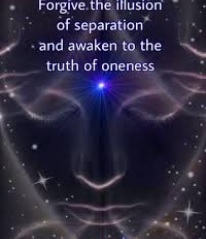
Development of unitive consciousness is the true Second Coming of Christ.
At the level of contemplative consciousness, we move beyond dualistic, either/or thinking. At this point, life and death, goodness and badness are not opposites. The one does not cancel out the other. There is enough spaciousness for everything to belong, a return to an elemental innocence, some kind of radical “okayness.” Our dualistic, logical minds keep coming to offer us the satanic temptation to eat again of the tree of the knowledge of good and evil, but this time we refuse. (Rohr)
Oneness is an experience that transcends the mind. When we experience oneness, we feel a connection with everything in existence on every level. In other words, we feel ‘at one’ with all things.
- The spiritual journey is not just about ascending. We also need to descend. We need to dive into the dark waters of our minds and do some soul-searching. We need to get comfortable with the blood, dirt, and grit of being human. To avoid our wild side is to avoid, deny, and disown a major and essential aspect of us: our divine and messy humanity.
- Once the veil of our limited perception has been removed, there is space for us to experience a more whole and integrated version of reality. Experiences of ego death and merging with all of existence.
- Wholeness is not achieved by cutting off a portion of one’s being, but by integration of the contraries.
- We must seek to reunite with the lost parts of ourselves and develop psychological balance.lonerwolf.com/oneness-wholeness/
Evil has divine nature within it. Rather than destroy it, our task is to uplift it.3,p160
Evil is a limit to the ability to love. True love stems from acceptance, just the way we are right now. (Fall 2024 Mendicant)
Duality requires separation. Yet the ultimate truth of the Divine is Oneness. Part of the process of separation merging back into Oneness is what we call death.3,p248
Resurrection represents a new level of consciousness well outside the boundaries of human experience. In it, humans will not sense an ego barrier of separation, but will be united in the totality of the universe.3,p296
The Grace / divine Love that provides for our needs is God being itself. God is our consciousness by which we co-create with life.2,p78
It is love alone that lasts (1 Corinthians 13:13)
When we are connected to the Whole, we no longer need to protect or defend the smaller parts. We are connected to something inexhaustible and unhurtable. (Rohr,9/2/20)
To see oneness, it is necessary to see from oneness, with the eye of the heart, not the binary skew of the mind. (Rohr,10/21/20)
Oneness is attained not through an even more intense experience of union, but through a simple suspension of the subject/object polarity that created the perception of twoness in the first place. Any moment you can break through to the underlying unity which is God’s gift in Christ. In the end, Praise praises. Thanksgiving gives thanks. Jesus prays. Openness is all.(Rohr,10/27/20)

When you make the two one and when you make the inner as the outer and the above as below, and when You make the male and the female into a single one, then you shall enter the kingdom.(The Gospel of Thomas)
How can the divine Oneness be seen? In beautiful forms, breathtaking wonders, awe-inspiring miracles? The Tao is not obliged to present itself in this way. If you are willing to be lived by it, you will see it everywhere, even in the most ordinary things. (Lao Tzu)
The end of a journey, as the final veil of separate selfhood—“self” consciousness itself—is drawn back to reveal at last the riddle of the true self. (Rohr,10/26/20)
In Oneness it is no longer merely like God, it has become God.11,p23
God is the coming together of opposites.11,p26
When self goes out, God comes in. What is blocking our union with God has to be surrendered for the UNION to take place. Surrender the selfish clinging to inner pleasure which is blocking the way to God.11,p99-100
The True Self, the place where the Divine Presence exists in us: the True Self is precisely the divine part of you that is great enough, deep enough, gracious enough to fully accept the human part of you. Paradoxically, immense humility, not arrogance, characterizes someone who lives in this True Self. You simultaneously know you are a child of God, but you also know that you didn’t earn it and you are not worthy of it. You know it’s entirely a gift. The purpose is: to allow you to experience your True Self—who you are in God and who God is in you—and to live a generous life from that Infinite Source.(Rohr)
No subject/object: Oneness is not experienced as a something, an object of perception. It is known by being it, directly, without subject and object duality. One is aware of one's body as part of all appearance, of all the perceived universe. All appearance that one can perceive through the senses is perceived as one and whole; there are differences but no partitions
- oneness being identified as a core element of mysticism and enlightenment, oneness has also been described as one of the most advanced forms of self-transcendence – that is, changes that involve fundamental transformations in the self or in how the self is perceived. Yaden et al. (2017)
- realize and experience the non-separation of self from the world or its “oneness” with the whole of reality
- the oneness and the person, are both Being; they are complementary. One is both. Once ego boundaries dissolve there will be no longer a sense of the person, that only oneness will be left
- colors are different from one another. They constitute one thing, like one fabric. Here we see that differentiation does not mean separation
- God is NOT separate from you, enlightenment is NOT someplace to get to
- oneness is already you; it always has been, and it always will be. What is needed is to wake up, to see things the way they are, instead of viewing them through distorting lenses
- the perception of oneness does happen, because it is a fact, it is the reality. It happens when we relax, when we abandon our beliefs and our ideas and our defensiveness and our fears, when we do not need to constantly be protecting ourselves and pushing away the outside, when we are not busy enhancing ourselves and thinking of ourselves
The key lies in reading Jesus’s life as a sacrament: a sacred mystery whose real purpose is not to arouse empathy but to create empowerment. In other words, Jesus is not particularly interested in increasing either your guilt or your devotion, but rather, in deepening your personal capacity to make the passage into unitive life. (Rohr)
Jesus is the microcosm of the macrocosm, the hologram of the whole, the corporate personality for humanity. “The soul’s journey into God,” as Bonaventure put it, was to learn how to see the unity of all being, how to look for this partially hidden God, and how to honor those footprints everywhere once they were seen. It was a surrender to gratitude—and to immense confidence that we are a part of something very good. (Rohr)
Union with God as something that has already taken place, whether we experience it or not. Our ego over-emphasizes our individuality and separateness from God and others. We’re not here to save our souls. That’s already been done once and for all—in Christ. As Thomas Merton wrote, “We are already one. But we imagine that we are not. And what we have to recover is our original unity. What we have to be is what we are.” (Rohr)
See 5 sacred paths to oneness
Symbolism and Metaphor
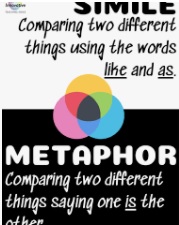
Since the nature of the Ultimate and our individual nature are the same and indivisible, to see one thing is to see all. (p42, Zen and the Gospel of Thomas)
It is great error to let our longing for God be eclipsed by our interest in the THINGS OF God. Reach out into the darkness, seeking to pierce the symbol, to penetrate the veil.11,p114
Mysticism is a way of seeing—beyond the turmoil, the rights and wrongs, the good guys and villains—to the radiant heart of things. Mysticism is not about concepts; it is about communion with ultimate reality. The mystical path is not fluffy. Jesus was referring to this as the “narrow gate” (Matthew 7:13–14). It’s rigorous and demanding. (Rohr)
New Heaven, New Earth, New Jerusalem
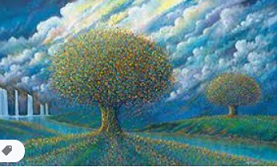
New heaven and a new earth, new JerusalemRev 21:1-2
Peace
see Love Is All Around